10/02/19
K-State Current - October 2, 2019
K-State Current is a weekly news update for the Kansas Board of Regents to apprise the Regents on a few of the many successes and achievements made by K-State faculty, staff and students.
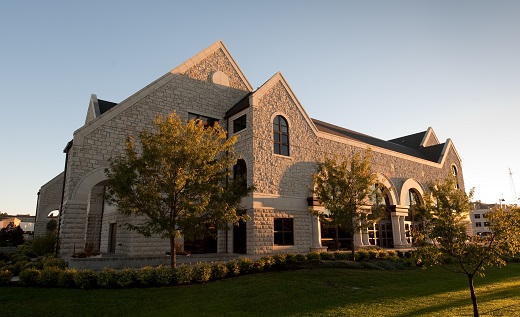
K-State News
Bin Ning to serve as first associate provost for institutional research
 Bin Ning, a highly experienced leader in higher education institutional research and related areas, will join Kansas State University as its first associate provost for institutional research.
Bin Ning, a highly experienced leader in higher education institutional research and related areas, will join Kansas State University as its first associate provost for institutional research.
Ning's appointment was made by Charles Taber, K-State provost and executive vice president, following a national search. Ning will start his new job on Oct. 14 and will report to Taber.
"With more than 34 years in higher education, including more than 18 years guiding institutional leadership at small colleges to research extensive universities, Dr. Ning has the experience needed to guide K-State through the development and implementation of an institutional data strategy that will make possible innovative approaches to enrollment management, university budgeting, strategic planning and more through data-driven decision-making," Taber said.
Currently the assistant vice president and executive director of institutional research and information management at Eastern Michigan University since July 2010, Ning will lead the newly established Office of Institutional Research at K-State, provide stewardship and management of the university's data, and oversee the creation of data analysis, analytical studies and institutional reports in response to federal, state and local entities, accreditation purposes and internal report needs. He also will be in charge of communication, education and training to enhance data-informed decision-making throughout the university.
"I am thrilled and excited to have the opportunity to contribute my experience and skills in institutional research and other areas in higher education to support the strategic directions of K-State," Ning said. "Across the nation, institutional research has become a pivotal unit that provides much-needed information support for sage decision-making, which is one of the keys for future success at K-State."
In his current position with Eastern Michigan, Ning leads the office of Institutional Research and Information Management, provides leadership to the overall institutional accreditation process, leads the university's enrollment forecasting and works closely with university leadership on enrollment and budget modeling. For his work, Ning received Eastern Michigan's 2018 Distinguished Achievement Award.
In his previous positions, Ning was executive director of the Office of Institutional Research at the University of Toledo from August 2007 to July 2010; dean of institutional effectiveness at Wayne County Community College District in Detroit from August 2005 to August 2007; and director of the Office of Institutional Research and Assessment at Marygrove College in Detroit from July 2001 to July 2005.
His current research interests include application of institutional data in policymaking and long-range planning processes; student engagement and other factors that impact student success; institutional assessment and research focusing on student learning, satisfaction and teaching effectiveness and learning outcome; and the role of international programs and comparative higher education. He has presented at conferences and given invited presentations nationally and internationally.
Ning also has served as an adjunct faculty member in statistics at Eastern Michigan University and Margrove College. He has been a peer reviewer for the Higher Learning Commission since 2004. Ning earned a bachelor's degree in engineering mechanics from the Beijing Institute of Technology in China and a Master of Education and doctorate in higher education, both from the University of Toledo.
NSF planning grant to help research team better understand needs of rural communities
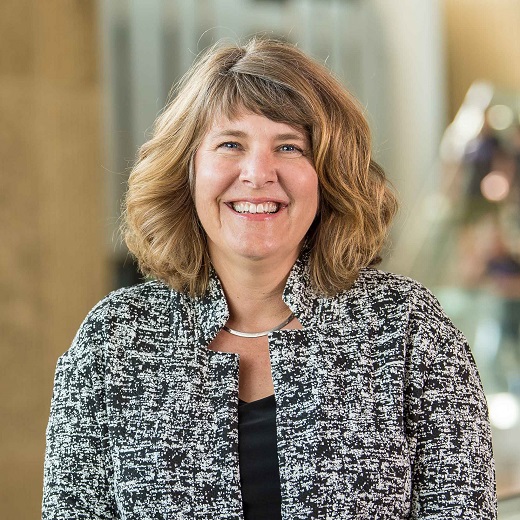 A fundamental societal assumption is that current migration toward cities is an ideal resource distribution. But 80% of the U.S. population who live in these urban centers are vulnerable to climate change results such as rising sea levels, storm surges and heat waves.
A fundamental societal assumption is that current migration toward cities is an ideal resource distribution. But 80% of the U.S. population who live in these urban centers are vulnerable to climate change results such as rising sea levels, storm surges and heat waves.
In light of this, the question that will be addressed at Kansas State University, recently funded by a National Science Foundation Engineering Research Center planning grant, becomes what should be our investment in infrastructure and systems in depopulating rural areas that would create a more resilient infrastructure overall in the areas of food systems, energy resources and healthy environments.
This one-year, $99,907 planning grant, the first of its type awarded to the university, will capture a more complete understanding of the rural landscape as defined by a wide range of stakeholders, allowing the team to understand these challenges to rural communities and create better engineered solutions. Information gained through gathering mechanisms such as workshops will be used to create a detailed database that will paint a contemporary picture of rural landscapes, highlighting the differences in human and natural capital, and providing the information needed to make informed decisions.
Stacy Hutchinson, associate dean of engineering and professor of biological and agricultural engineering in the Carl R. Ice College of Engineering at Kansas State University, is principal investigator on the planning grant that includes co-investigators Melanie Derby, associate professor of mechanical and nuclear engineering, and Nathan Hendricks, associate professor of agricultural economics.
They will partner with colleagues from the University of Nebraska-Lincoln and Washington State University to plan for an Engineering Research Center for ENgineered Solutions for rUral Resilience — ENSURE: Food, Energy, Environment, and Infrastructure. ENSURE will then seek to create sustainable rural communities through engineering innovations and in partnership with rural stakeholders.
Following completion of the planning grant year, the team intends to submit a full center proposal to the NSF. If successful, it will be the first such center in the state of Kansas and Kansas State University will be the lead institution on this effort to generate resilient, engineered systems in conjunction with rural stakeholders, creating sufficient capacity in rural communities — those across the U.S. and worldwide — to adapt and respond to adverse climate, environmental and economic conditions.
"Using this planning grant," Hutchinson said, "our team will develop a more complete vision of the rural landscape, including differences in and relationships between the social, political, human and cultural capitals in conjunction with natural, built and financial capitals.
"We will be looking at things such as improved energy distribution, wastewater treatment, data transfer and internet service, as well as helping new investors know where to go for expanded economic growth, all in an effort to return to and maintain thriving rural communities."
Engineering Extension program receives 2019 Excellence Award
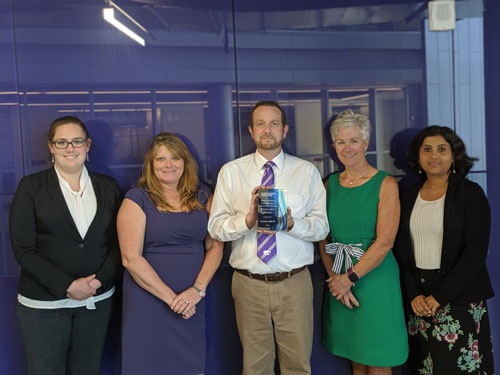 The National Steering Committee of Small Business Environmental Assistance Programs, known as SBEAPs, and Small Business Ombudsmen, or SBO, has selected the Kansas Small Business Environmental Assistance Program, part of the Pollution Prevention Institute in Kansas State University Engineering Extension, to receive the 2019 Small Business Environmental Assistance Program Award for Excellence.
The National Steering Committee of Small Business Environmental Assistance Programs, known as SBEAPs, and Small Business Ombudsmen, or SBO, has selected the Kansas Small Business Environmental Assistance Program, part of the Pollution Prevention Institute in Kansas State University Engineering Extension, to receive the 2019 Small Business Environmental Assistance Program Award for Excellence.
The award category recognizes exemplary performance of one SBEAP/SBO or individual in the areas of compliance assistance, sustainability, advocacy and collaboration at the national level. The SBEAP Excellence Award emphasizes a state program or individual leadership that has created resources and work products, promoted policy advancements, developed program innovations and established new partnerships to build a strong network of small business assistance.
"Not only does the Kansas SBEAP serve as a vital resource for businesses in the state, but program staff members are leaders in the national SBEAP network, benefiting small businesses nationwide," said Lisa Ashenbrenner Hunt, national steering committee chair of the SBEAPs/SBO. "Of particular note is their creation and maintenance of the national SBEAP website, which allows SBEAPs across the country to share ideas and resources, greatly increasing the programs' effectiveness and efficiency."
"We are humbled and honored with this award from our state peers," said Nancy Larson, director with the K-State Pollution Prevention Institute and Kansas SBEAP. "In our line of work, we learn new things daily and could not have the program we have in Kansas without help from other state SBEAPs."
The national steering committee SBEAP/SBO awards are the states' premier awards program for recognizing outstanding environmental leadership among small businesses and small business assistance providers. A sponsoring partner in this awards program is the U.S. EPA Asbestos and Small Business Office.
The award was presented at the 2019 Annual SBEAP/SBO Training May 15 in Chicago.
The K-State Pollution Prevention Institute will celebrate 30 years of service during an open house on Oct. 10. For more details, visit ksuppi.org/events.
The Small Business Environmental Assistance Programs and Small Business Ombudsmen were created under Section 507 of the Clean Air Act Amendments of 1990. For more than 25 years, the SBEAP/SBO have provided extensive, hands-on technical assistance to small businesses across the country to help them understand and comply with complex environmental regulations. The SBEAP/SBO website is a resource for program participants and small businesses.
K-State Faculty Highlights
Biology professor publishes new textbook on landscape ecology
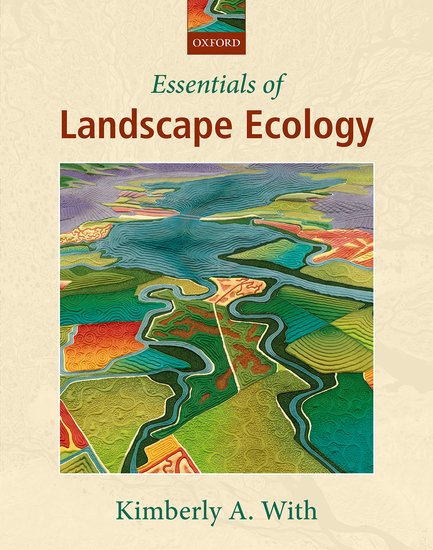 Kimberly With, professor of biology, has just published the first edition of her textbook "Essentials of Landscape Ecology" through Oxford University Press.
Kimberly With, professor of biology, has just published the first edition of her textbook "Essentials of Landscape Ecology" through Oxford University Press.
Landscape ecology seeks to understand the human dimensions and ecological consequences of land-use change that are contributing to the loss and fragmentation of natural habitats worldwide, as well as to the global climate and biodiversity extinction crises. More generally, landscape ecology studies the interactions between landscape structure and ecological processes across a wide range of scales and in a variety of ecosystems, including aquatic and marine ones.
The first half of the textbook focuses on the core concepts of landscape ecology, including issues of spatial and temporal scale in ecological research, how various types of natural and anthropogenic disturbances influence landscape structure, methods for the analysis of landscape structure and other spatial patterns, and how best to assess landscape connectivity. The second half of the book examines how landscape structure and other forms of spatial heterogeneity influence ecological processes, including individual dispersal and movement behavior, population distributions and dynamics, the spread of invasive species or diseases, landscape genetics, community structure and dynamics, and ecosystem function. Throughout, the textbook emphasizes applications for conservation and the management of sustainable landscapes. The book is available in hardcover, softcover and e-book versions.
With was named a distinguished landscape ecologist in 2016 by the North American chapter of the International Association of Landscape Ecology, which is the highest honor bestowed by that organization and recognizes those unique individuals whose thinking and writing have helped to shape the field of landscape ecology. In the history of association-North America, she is the only person to have twice been awarded Outstanding Paper in Landscape Ecology for her research contributions to the field. Her research investigates the effects of habitat loss, fragmentation, and land-management practices on the occurrence, viability, and population connectivity of various groups of species, including birds of the Flint Hills and pond-breeding frogs and toads in the Brazilian Cerrado.
K-State Student News
Student showcased clothing collection at Kansas City Fashion Week
 Gracie Key, junior in apparel and textiles, Louisburg, debuted her design collection, The Kennedy Collection, during Kansas City Fashion Week Sept. 15-21 at Union Station in Kansas City.
Gracie Key, junior in apparel and textiles, Louisburg, debuted her design collection, The Kennedy Collection, during Kansas City Fashion Week Sept. 15-21 at Union Station in Kansas City.
Each season, fashion week gives students from across the nation an opportunity to showcase their own collections on the runway.
"I am so grateful to have gotten the opportunity to participate in KCFW," Key said. "Through this journey, I have been able to meet so many new people and experience a new and exciting perspective of the fashion industry. I have learned a lot by being a leader and exercising my creative process. Overall, fashion week has been a great learning experience and something that I look forward to participating in again."
Key has been designing and constructing clothes from a young age and aspires to continue her work throughout her life. Her brand, GK Designs, is a women's wear designer brand that is sustainable and also affordable. The mission of her brand is to help young women discover the power of confidence through fashion. Being a young designer, she understands the struggle of keeping a positive body image in today's society and feels fashion is a great way for people to express themselves. She wants to help consumers find empowerment in their clothing choices, rather than basic trends.
The featured collection, The Kennedy Collection, is a modern take on vintage fashion.
"My inspiration came from Jackie Kennedy Onassis," Key said. "Not only was she a fashion icon, but she also was known to carry herself with grace and elegance wherever she went, and that is exactly the kind of confidence I want to give young women. Onassis' quote 'Once you can express yourself, you can tell the world what you want from it' was a huge inspiration to me and perfectly embodies the meaning behind my collection."
Key’s apparel can be found on her Instagram, @graciekey.designs.
Also selected to showcase a collection was 2017 apparel and textiles graduate, Annabelle Frese.
As a designer, Frese is inspired by history and cultures and strives to design garments that express a muted uniqueness and high-end individuality. She aims to take classic and historic silhouettes and add her modern twist to generate new styles. Frese is currently an independent designer for her own brand, Fashion AF, which creates custom garments for a variety of events.
KCFW and the K-State apparel and textiles program have a great relationship, with many students having received the opportunity to showcase their work during the event. Teisha Barber, president of KCFW, has praised the apparel and textiles program with producing good quality work and students who are extremely professional.
For more information on Kansas City Fashion Week, visit kcfashionweek.com.
Food science doctoral student presents at international conference
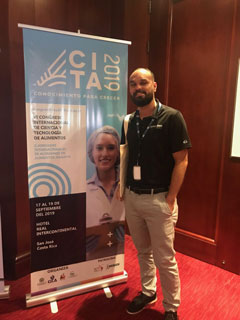 Daniel Vega, doctoral candidate in food science, attended the VI Congreso Internacional de Ciencia y Tecnología de Alimentos, known as CITA 2019, Sept. 17-19 in San José, Costa Rica. Vega presented a poster on his research to control important foodborne pathogens in various bakery products.
Daniel Vega, doctoral candidate in food science, attended the VI Congreso Internacional de Ciencia y Tecnología de Alimentos, known as CITA 2019, Sept. 17-19 in San José, Costa Rica. Vega presented a poster on his research to control important foodborne pathogens in various bakery products.
This research is a component of a multiyear, multi-institution effort to assess the antimicrobial lethality of commercial oven baking and/or frying operations to eliminate Salmonella, Shiga toxin-producing E. coli and Listeria monocytogenes that may occur due to natural contamination of raw ingredients, primarily raw flour. Data from these studies are then used to develop predictive modeling tools that can be used by the food industry to verify the capabilities of their individual manufacturing processes to produce safe, ready-to-eat consumer bakery products.
At the conference, Vega presented findings from studies to assess the baking lethality associated with peanut butter cereal bars, one of approximately 10 products investigated to date by the K-State Food Safety Lab, led by Randall Phebus, professor of food safety in the Food Science Institute. This on-going research is sponsored by AIB International in Manhattan, in conjunction with the American Bakers Association.
A travel grant to attend the international conference was provided by the Graduate School.